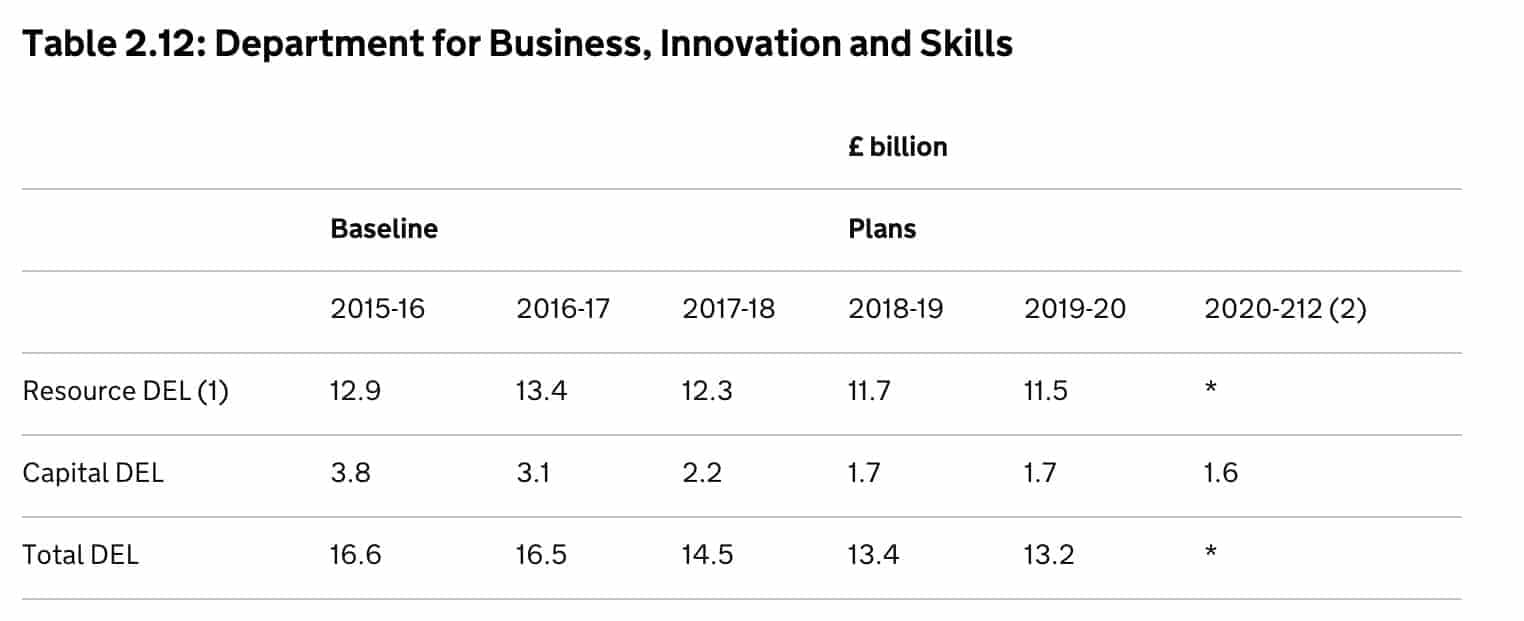The Chancellor of the Exchequer George Osborne has set out the 2015 Spending Review and Autumn Statement, which together set the course of Government spending over the next four financial years, up to the next General Election in 2020.
Fears that the BIS budget would be cut by 30% has not come to pass, the overall cut to the department will be 17%. Crucially, the switch from maintenance grants to loans, announced in the summer’s Budget, is being allowed to count in this Spending Review which the Government estimate to be around £2bn. The science budget is being protected in real terms, which will be strongly welcomed by the research community, and the Nurse Review is to be implemented in fully.
However there is still pain on the horizon – for universities and for graduates.

The key points for universities:
Postgraduate loans are going ahead and the government will lift the age cap on new loans to postgraduates from 2016-17 so they are available to all those under 60. 50% intensity of study is required to be eligible and the loans will only be available to students at institutions with Degree Awarding Powers. Repayment is 6% of income over £21k (lower than the standard 9%) and no repayments to be made before April 2019. The loans will be written off after 30 years. The age eligibility move from 30 to 60 will be welcomed by the sector which was almost unanimous in its response to the Government earlier this year that 30 years was far too low. The Government response to the PG loans consultation is now out here.
Also for international postgraduates – “dependants of postgraduates on courses lasting more than a year will be welcome to come and work. Current English language requirements will be maintained.”
The government will introduce new part-time maintenance loans from 2018-19 to support the cost of living while studying. The government expects 150,000 part-time students could benefit each year by the end of the Parliament. This will be widely welcomed after the absence of anything on part time in the Green Paper.
A version of ELQ is being lifted as for all STEM subjects, tuition loans will be extended to students wishing to do a second degree from 2017-18.
The government will reduce the teaching grant by £120 million in cash terms by 2019-20, but allow funding for high cost subjects to be protected in real terms. It is currently £1.4bn in total. The Student Opportunity Fund will be hit here and the Government will “ask the Higher Education Funding Council for England to retarget and reduce the student opportunity fund, focusing funding on institutions with the most effective outcomes.” According to BIS, the fund could be “cut up to half.” “Outcomes” are likely to hint at an increase focus on measures to tackle retention. “The government will also make savings in other areas of the teaching grant.” – we will have to wait and see how HEFCE and the Government reach a way forward on the details of this.
The student loan repayment threshold for Plan 2 borrowers will be frozen until April 2021. The discount rate applied to student loans will be revised to 0.7% above RPI, to bring it into line with the government’s long-term cost of borrowing. Taken together, this will reduce the government’s estimate of the long-term student loans subsidy (RAB charge) to around 30%. This is the outcome of the Government’s announcement in the summer’s Budget and subsequent consultation and will prove to be controversial, as the move will hit the lower earners harder. The Government’s full response to their consultation is now out.
Universities will be subject to the apprenticeship levy which now covers all large employers with pay bills over £3m, and covers total earnings (not pensions or National Insurance) which means all but one HEI will be subject to it. This will be an unexpected cost of about £63m for the whole sector. Although it’s possible that universities that offer higher level apprenticeships themselves could be net beneficiaries from the scheme. You can find more details of this in the government’s response to their consultation on the policy here.
BIS will reduce departmental administration spending by a further £100 million by 2019-20. This will contribute to a wider programme of reform, including further reducing the number of Arm’s Length Bodies (ALBs), unlocking efficiencies through increased digitisation and increasing the pace of estates and workforce reform. The bonfire of the quangos may continue then, although we’ll have to wait for more detail as to exactly how. Some savings will be made when the Office for Students opens as universities will need to pay for this as a subscription.
Grants for student nurses are being replaced with loans and the cap is being lifted on places, the Government estimate this will free up 10,000 additional place. This was expected but will prove controversial. It is unknown what effect it will have on participation. The Council of Deans has some useful facts about this change here.
The government has accepted the recommendations of the Nurse Review and will introduce Research UK – which will work across the seven Research Councils. “This will take the lead in shaping and driving a strategic approach to science funding, ensuring a focus on the big challenges and opportunities for UK research.” Innovate UK (which is technically a research council) may also be integrated in to RUK. All of this will require primary legislation.
The government will begin a review of the Research Excellence Framework (REF) “in order to examine how to simplify and strengthen funding on the basis of excellence”. More details about this will be set out shortly, but early fears are that the government intends to use this as an opportunity to introduce a greater use of metrics in to the exercise.
Our friends over at The Guardian‘s Political Science have a good round up of what the Spending Review means for science and research here.
Over at GuildHE’s Annual Conference, HE economics expert and Wonkhe contributor Andrew McGettigan gives us his instant reaction to the Spending Review:
Also:
- The government will run a £20 million competition to set up a new Institute of Coding that will train the next generation in higher level digital skills.
- Support will be provided to secure launch funding to create a new university in Hereford focused on engineering in 2016 (subject to relevant approvals).
- The government will help to fund the £100 million development of a new campus in Battersea for the Royal College of Art (subject to relevant approvals).
- The student loan book sale is now expected to be completed in 2016-17.
You can download all the Spending Review documents here.
This piece will be updated as more detail comes to light.












